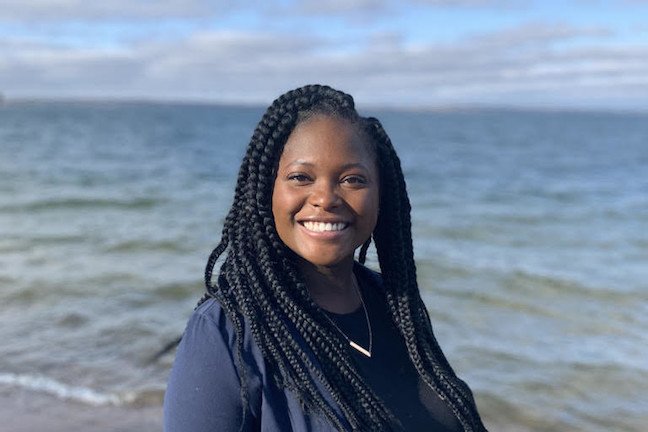DEI coordinator emphasizes inclusion and education in new role

Gabbi Horsford discusses her Medtronic-supported position in the BME department
September 17, 2021
Health equity has long been an interest of Gabbi Horsford. As a grad student at the University of Minnesota School of Public Health (SPH), her research focused specifically on racial inequities for Black women—but in January 2020, she also studied violent encounters between police and young Black men. After the murder of George Floyd in summer 2020, she helped create the Diversity, Equity, and Inclusion (DEI) Action Team in SPH’s Division of Epidemiology and Community Health.
Now, she’s bringing that DEI team experience and expertise in racial inequities to a new position at the College of Science and Engineering’s Department of Biomedical Engineering (BME). The DEI coordinator role is funded in part by a recent gift from Medtronic. The Fortune 500 company, founded by College of Science and Engineering (CSE) alumnus Earl Bakken, and CSE share a goal of educating diverse talent and retaining a diverse workforce.
In this newly created role, Horsford will develop programs and policies that elevate diversity, equity and inclusivity throughout the department. This includes increasing the number of Black, Indigenous, and People of Color undergraduate and graduate students to proportionally reflect Minnesota's population.
In this Q&A, Horsford discusses her priorities, the importance of DEI in science and technology fields, and the impact she hopes to have on the BME community.
Tell us about your background. Did you always know you wanted to go into DEI?
I always knew that I wanted to work in program development or coordination, but I didn't really know that DEI in higher education was an actual job until last summer. It's kind of the invisible labor that a lot of students and faculty of color do when they're in school. It was just something that had to be done. Now, it’s great that it's something departments recognize as a valuable position. I really like being able to help students feel comfortable and achieve their goals, and helping faculty and staff learn more about current DEI topics.
What will you be doing in this role?
Right now, my major priority is to finish the strategic plan. We have five main goals, which are recruitment, retention, advancement, health equity, and community engagement. Those are very big goals, and we want to make sure that our department is a diverse environment where all parties feel comfortable, respected, and welcome, and they're all getting the resources to thrive.
What do you think makes you a good fit for this role?
I don't think that anyone is an expert in DEI per se. I don't think anyone knows everything. It’s going to be a learning experience for everyone, including myself. However, I do think that my identity and experiences as a Black woman who's been in higher education for six years will definitely help in my position. Also, my knowledge of program development and evaluation will be really useful in making sure that I am developing programs and policies that have equity built into them.
What drew you to the College of Science and Engineering specifically?
I’m passionate about health care and equity, and so to me, BME is an interesting and unique area because it creates mechanisms that can hold a lot of bias and have really powerful impacts on people's health. For example, when I bought my Apple Watch, I was choosing between the one I have and the another one that had skin oxygen level monitors. I didn't buy that one because studies have shown they don't read dark skin accurately. So, I feel that here in BME we have a really good opportunity to change bias in healthcare devices. If the machine that you're using has a built-in bias, you’re not going to get the same level of care as, for example, a white person.
How do you see yourself making an impact in this position?
In my first year, I want to make sure that this environment is very inclusive. That entails holding faculty, staff, and students accountable and also providing them with the education and resources needed to make that happen. Long term, the impact that I would like to make is increasing STEM literacy in K-12 students in the Minneapolis and St Paul area. Everyone wants to recruit more diverse talent into their departments. That’s a great goal, but students lose interest in STEM, especially students of color, around third grade. So, if we just keep doing what we're doing, we are not going to see the increase in diversity that we need in our STEM programs.
What are you most excited about for this role?
I am most excited about increasing health equity knowledge in our classes and making sure that our students are leaving the program with knowledge of health equity both in principle and in practice. So, when they're designing products in their careers or in a laboratory as a Ph.D. student, they can make sure that they are creating products that have a positive impact on every individual.
Interview by Olivia Hultgren
Learn more about Gabbi’s background in this School of Public Health interview.
For information about the Diversity, Equity, and Inclusion (DEI) efforts in University of Minnesota Department of Biomedical Engineering, see the BME DEI website.
